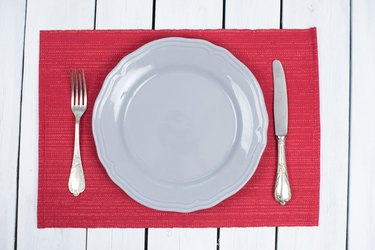
Iron is an essential mineral required for several important biological processes, including protein synthesis and red blood cell formation. Low levels of iron in the body, or iron deficiency, can cause a variety of symptoms, including appetite loss. Iron deficiency is the most common nutrient deficiency in the United States, according to the Linus Pauling Institute at Oregon State University. If you suspect you have an iron deficiency, consult a doctor for diagnosis and treatment options.
Appetite Loss
Video of the Day
Low levels of iron in the body can lead to a condition known as iron-deficiency anemia. This condition results when levels of iron are too low to enable sufficient production of red blood cells. Because red blood cells carry oxygen to every cell in your body, iron-deficiency anemia can cause wide-ranging symptoms, including appetite loss, particularly among children and infants, reports the MayoClinic.com.
Video of the Day
Iron Supplements
In cases of appetite loss resulting from low iron levels, taking iron supplements may improve appetite. Taking 150 mg iron supplements daily for 14 weeks improved appetite in a study of 87 iron-deficient children in Kenya, reports an article published in the May 1994 issue of the "Journal of Nutrition." Improving appetite in iron-deficient children can help improve growth rates and may also reduce disease rates among malnourished children.
Additional Symptoms
Anemia resulting from iron deficiency can cause many other symptoms, particularly extreme fatigue, muscle weakness and shortness of breath. Dizziness, fainting, lightheadedness and headache are also common. Poor circulation may also result, causing pale skin and cold hands and feet. Irritability and strange tingling sensations in the legs have also been reported, advises the MayoClinic.com.
Increasing Iron Intake
One way to avoid low iron levels and appetite loss is to ensure you eat foods containing enough iron. Foods rich in iron include dried beans, egg yolks, liver and lean red meat, reports National Institutes of Health online medical encyclopedia Medline Plus. Several types of seafood, including oysters, salmon and tuna also contain high levels of iron. Whole grains also are sources of iron, as are breakfast cereals that are fortified with iron. Shellfish, pork and lamb also contain significant levels of iron.